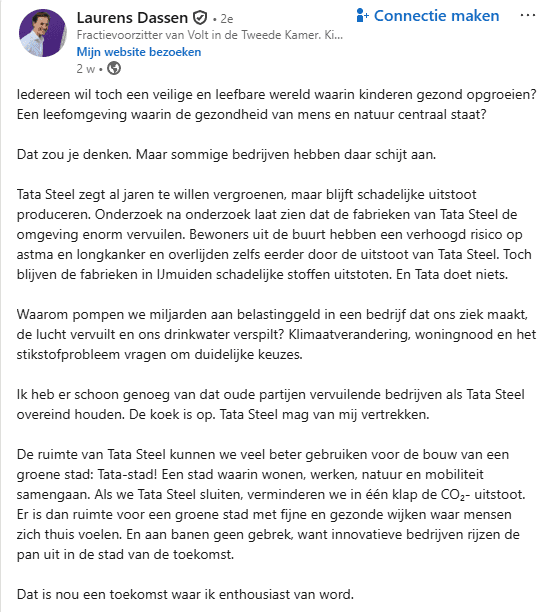The Hague Innovation Check: Volt in the lead
Which parties actually translate innovative ideas into the House of Representatives?
Published on September 25, 2025

Our DATA+ expert and Editor-in-Chief, Elcke Vels, explores AI, cyber security, and Dutch innovation. Her "What if..." column imagines bold scenarios beyond the norm.
October 29 is the big day: the Netherlands will be heading to the polls en masse for the House of Representatives elections. The elections coincide with a period of significant political and social transitions in our country. Innovation will help shape how important issues such as climate change, healthcare, and food safety will evolve in the coming years. Which parties will actually translate innovative ideas into policy in the House of Representatives? IO+ conducted an Innovation Check in The Hague and examined thousands of votes.
About the Innovation Check
Volt: the most innovative party
Our research shows that Volt votes most innovatively, with a score of 80.7%. GroenLinks-PvdA is in second place with 79.2%, while the PVV (34.6%) and Forum voor Democratie (FvD, 35.4%) score lowest.
Volt distinguishes itself through its consistent support for innovation, which is evident in its voting behavior, social media presence, and election platform. Issues supported by Volt include the construction of an AI factory, technological applications in healthcare, and the climate. For example, party leader Laurens Dassen argued on LinkedIn for the closure of Tata Steel in the context of CO₂ targets:

While Volt wants to get rid of Tata Steel, other parties are diametrically opposed. The PVV, for example, says: “Tata Steel accounts for almost 10,000 jobs, and CO2 is not pollution. What's more, the nitrogen crisis only exists on paper and not in the real world.”
The FvD is also opposed to climate policy. The party supported a motion calling for less climate policy and the reopening of the Groningen gas field. In its election program, the party also advocates an end to climate policy. And party leader Lidewij de Vos reported on it on X.
Climate and sustainability
We then looked at the subcategories of innovation. For Climate and Sustainability, we analyzed voting behavior around innovations that accelerate the transition to clean energy, a circular economy, and sustainable industrial practices. Think of solar and wind energy storage, energy-efficient production technologies, reuse of materials, smart recycling processes, and CO₂ reduction solutions.
GroenLinks-PvdA scored highest in this category (78.3%), followed by ChristenUnie and Volt (both 77.9%). FvD (23%) and PVV (27.6%) scored lowest.
For example, GroenLinks-PvdA MP Suzanne Kröger tabled an amendment to allocate additional funds for solar panels for tenants of housing associations. The PVV and FvD, among others, voted against it. In its election program, GroenLinks-PvdA also emphasizes a healthy nature, clean energy, and tackling major polluters. The party says: “We will stop subsidies on fossil fuels, and polluters will pay the price for their emissions.”
Innovation in healthcare and agriculture
For the category of Innovation in healthcare and agriculture, we examined voting behavior on issues such as new cancer therapies, the use of robots in elderly care, and the application of drones in agriculture.
DENK and SP share first place (89.9%), while FvD scored lowest (31%).
The fact that healthcare is a priority for DENK is evident, for example, from a motion by Stephan van Baarle. In it, he stated that additional defense investments can only be discussed once it is certain that there will be no cuts to healthcare, education, and social security. DENK also emphasizes the importance of preventive care in its election program.
Data
The Data category concerns information in a form that computers can store, process, and analyze. This includes developments in AI, as well as medical imaging, quantum computing, traffic data, cybersecurity, and data sovereignty.
Volt scored highest (88.3%), followed by GroenLinks-PvdA (84.8%). PVV (45.5%) and FvD (49.7%) are at the bottom.
For example, Volt MP Marieke Koekkoek submitted a motion to set up a Dutch AI facility. Volt also expresses support for the construction of such a factory in its election program.
Preconditions for innovation
The fourth category is Community. This concerns the preconditions for innovation, including policy, regulations, and knowledge transfer. Examples include subsidies, support for start-ups, and policy measures that promote cooperation and knowledge exchange.
D66 and Volt share first place (72.6%), while PVV (24.2%) and PvdD (41.9%) scored lowest.
For example, D66 Member of Parliament Joost Sneller submitted a motion requesting the government to establish a Dutch innovation authority. This authority would promote innovation and competitiveness and assess new legislation and regulations. It would stimulate innovation and examine the impact of new laws on the innovation process. The PVV and PvdD voted against the motion.
An example from the election program: D66 proposes a Minister of Technology and Innovation, “because technology and innovation are too important to remain fragmented across different ministries.”
Chips
Our Chips category covers chips, microelectronics, and photonics, which form the core of modern technology. Because only four relevant issues have been discussed in the House of Representatives, we have not assigned a representative innovation score to this category.
Next week, a new story in the series will be published, about data sovereignty.
